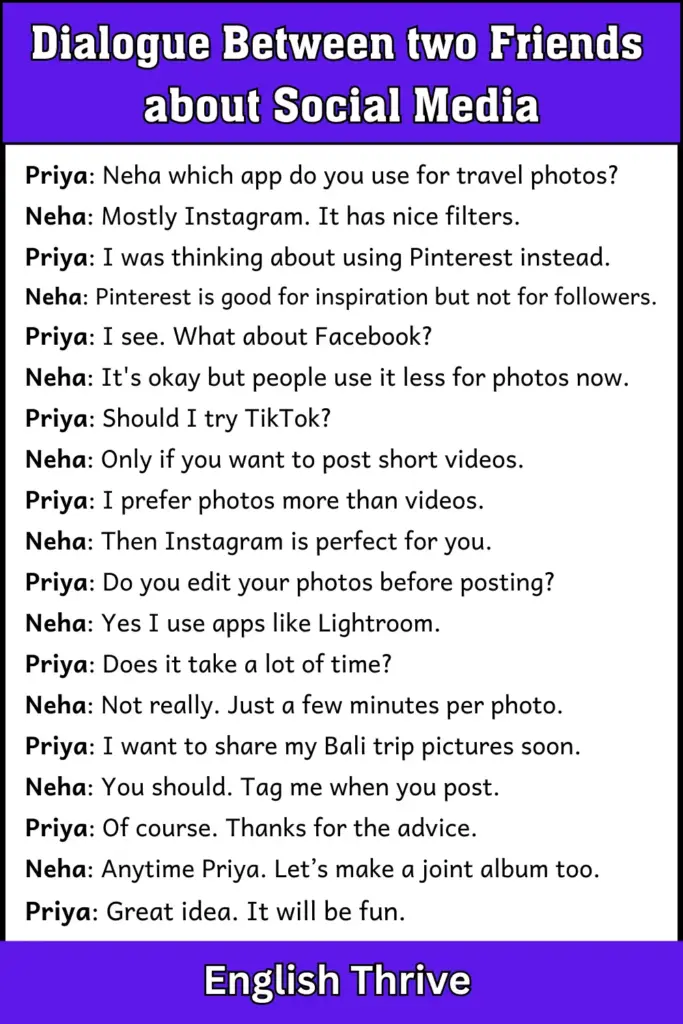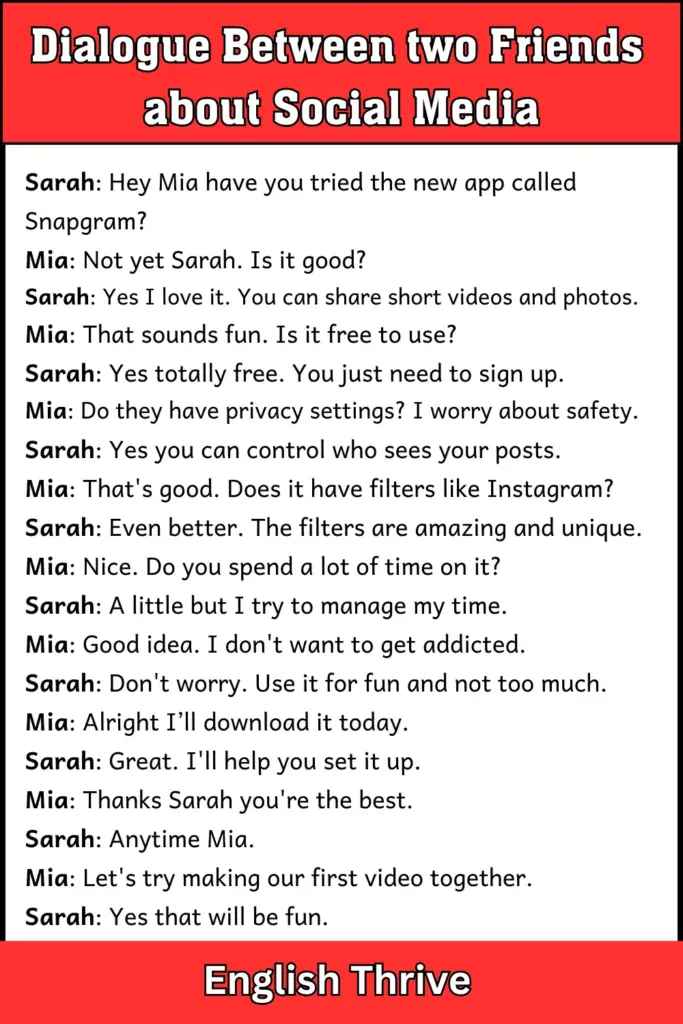In this article we will learn how to write a dialogue between two friends about social media. We have discussed five sample dialogues. Suitable for beginners to advanced students.
Contents
ToggleSample 1: dialogue between two friends about social media
Context: Sarah and Mia are friends discussing a new social media app that everyone is talking about.
Dialogue:
Sarah: Hey Mia have you tried the new app called Snapgram?
Mia: Not yet Sarah. Is it good?
Sarah: Yes I love it. You can share short videos and photos.
Mia: That sounds fun. Is it free to use?
Sarah: Yes totally free. You just need to sign up.
Mia: Do they have privacy settings? I worry about safety.
Sarah: Yes you can control who sees your posts.
Mia: That’s good. Does it have filters like Instagram?
Sarah: Even better. The filters are amazing and unique.
Mia: Nice. Do you spend a lot of time on it?
Sarah: A little but I try to manage my time.
Mia: Good idea. I don’t want to get addicted.
Sarah: Don’t worry. Use it for fun and not too much.
Mia: Alright I’ll download it today.
Sarah: Great. I’ll help you set it up.
Mia: Thanks Sarah you’re the best.
Sarah: Anytime Mia.
Mia: Let’s try making our first video together.
Sarah: Yes that will be fun.
Sample 2: dialogue between two friends about social media
Context: Alex feels overwhelmed and talks to Sam about taking a break from social media.
Dialogue:
Alex: Hey Sam I deleted my social media apps yesterday.
Sam: Really Alex? Why did you do that?
Alex: I felt I was spending too much time online.
Sam: I understand. It can be distracting sometimes.
Alex: Yes and I was comparing myself to others too much.
Sam: That happens to many people. Did you feel better today?
Alex: Yes I had more time to read and relax.
Sam: That’s great. Are you planning to stay offline for long?
Alex: Maybe for a week or two. I need a break.
Sam: Sounds good. Social media will still be there later.
Alex: Exactly. I want to focus on real life more.
Sam: Maybe I’ll try a short break too.
Alex: You should. It’s refreshing.
Sam: But I’ll miss chatting with friends online.
Alex: You can still text them or call.
Sam: True. That’s a better option sometimes.
Alex: Let’s plan a weekend hangout instead of scrolling.
Sam: Deal. It will be fun.
Alex: Perfect. Less screen time more real time.
Sample 3: dialogue between two friends about social media
Context: Emma wants to learn about social media marketing and asks her friend Jake for tips.
Dialogue:
Emma: Hey Jake you know a lot about social media right?
Jake: A little. Why do you ask Emma?
Emma: I want to start an online store. I need marketing tips.
Jake: Oh that’s exciting. Social media can help a lot.
Emma: Which platform is best for beginners?
Jake: Instagram is great for photos and products.
Emma: Should I make a business account?
Jake: Yes it gives better insights and tools.
Emma: Do I need to post every day?
Jake: Not every day but stay consistent.
Emma: What about ads? Should I invest money?
Jake: Start small. Learn how they work first.
Emma: Do hashtags really help?
Jake: Yes they improve visibility if used smartly.
Emma: How long did it take you to learn this?
Jake: A few months of practice and research.
Emma: I guess I’ll have to be patient.
Jake: Yes but it’s worth it.
Emma: Thanks Jake you always explain things well.
Jake: Anytime Emma. Let’s plan a content strategy together.
Sample 4: dialogue between two friends about social media
Context: John and Lisa are talking about the problem of fake news spreading on social platforms.
Dialogue:
John: Lisa did you see that news about a celebrity yesterday?
Lisa: Yes but I think it was fake.
John: Really? It looked real to me.
Lisa: Many fake stories spread online. You must check sources.
John: How do I know what is true?
Lisa: Always read from trusted news websites.
John: I guess I shouldn’t believe everything I see.
Lisa: Exactly. Some people create rumors for attention.
John: That’s sad. It confuses so many people.
Lisa: Yes and sometimes it causes panic.
John: Do social media apps remove fake posts?
Lisa: They try but not all of them.
John: So we must be careful ourselves.
Lisa: Right. Always double-check facts.
John: I’ll start doing that from now.
Lisa: Good idea. We should also educate friends.
John: Yes spreading awareness helps.
Lisa: Social media is powerful but we must use it wisely.
John: I completely agree.
Sample 5: dialogue between two friends about social media
Context: Priya and Neha are comparing different social media apps to decide which one is better for sharing travel photos.
Dialogue:
Priya: Neha which app do you use for travel photos?
Neha: Mostly Instagram. It has nice filters.
Priya: I was thinking about using Pinterest instead.
Neha: Pinterest is good for inspiration but not for followers.
Priya: I see. What about Facebook?
Neha: It’s okay but people use it less for photos now.
Priya: Should I try TikTok?
Neha: Only if you want to post short videos.
Priya: I prefer photos more than videos.
Neha: Then Instagram is perfect for you.
Priya: Do you edit your photos before posting?
Neha: Yes I use apps like Lightroom.
Priya: Does it take a lot of time?
Neha: Not really. Just a few minutes per photo.
Priya: I want to share my Bali trip pictures soon.
Neha: You should. Tag me when you post.
Priya: Of course. Thanks for the advice.
Neha: Anytime Priya. Let’s make a joint album too.
Priya: Great idea. It will be fun.

FAQs about dialogue between two friends about social media
1. Why do people use social media so much?
People use social media to connect with friends, share updates, learn new things, promote businesses and stay entertained.
2. How can I stay safe on social media?
Use strong passwords, enable privacy settings, avoid oversharing personal details and verify information before trusting it.
3. Can social media be harmful?
Yes, if overused it can affect mental health, cause distractions and expose users to misinformation. Balance and awareness are key.


